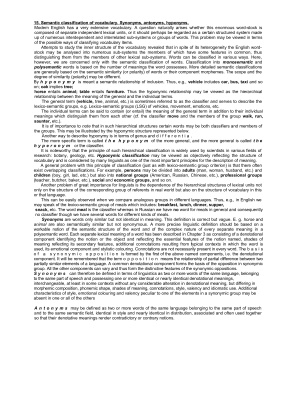Lexicology as a branch of linguistics. Subject matter. Links with
other branches. Problems.
General and special lexicology. Historical and mode lexicology.
Word as a language unit.
Meaning. Different approaches to the problem.
Types of Meaning. The semantic structure.
Motivation. Types of Motivation.
Notion and meaning.
Semantic change. Causes of Semantic Change.
Types of Semantic change. Result.
Polysemy in synchronic approach. Types of meaning.
Diachronic approach to polysemy.
Homonymy. Classification of homonyms.
Origin of homonyms.
Polysemy and homonymy.
Semantic classification of vocabulary. Synonyms, antonyms, hyponyms.
Synonym. Problem of definition.
Synonymity in synchronic and diachronic approaches.
Phraseology. different approaches.
Phraseological units vs. free word-combinations. Criteria of distinction.
Synchronic and Diachronic approaches to phraseology.
Word-structure. Types of morphemes.
Structural Types of Words. Morphemic structure vs Derivational structure.
Affixation.
Compounding.
Conversion.
Minor ways of word-formation.
BORROWINGS.
Ways of replenishment of the vocabulary.
Stylistic characteristics of the vocabulary.
Territorial variants of English in the lexicological aspect.
Lexicography as a science. Historical background.
General and special lexicology. Historical and mode lexicology.
Word as a language unit.
Meaning. Different approaches to the problem.
Types of Meaning. The semantic structure.
Motivation. Types of Motivation.
Notion and meaning.
Semantic change. Causes of Semantic Change.
Types of Semantic change. Result.
Polysemy in synchronic approach. Types of meaning.
Diachronic approach to polysemy.
Homonymy. Classification of homonyms.
Origin of homonyms.
Polysemy and homonymy.
Semantic classification of vocabulary. Synonyms, antonyms, hyponyms.
Synonym. Problem of definition.
Synonymity in synchronic and diachronic approaches.
Phraseology. different approaches.
Phraseological units vs. free word-combinations. Criteria of distinction.
Synchronic and Diachronic approaches to phraseology.
Word-structure. Types of morphemes.
Structural Types of Words. Morphemic structure vs Derivational structure.
Affixation.
Compounding.
Conversion.
Minor ways of word-formation.
BORROWINGS.
Ways of replenishment of the vocabulary.
Stylistic characteristics of the vocabulary.
Territorial variants of English in the lexicological aspect.
Lexicography as a science. Historical background.

